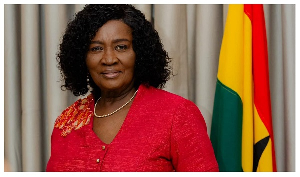By George Sydney Abugri
This week, Minister of Petroleum, Mr Emmanuel Armah-Kofi Buah made an announcement that must have been received with some applause by many in the energy sector: Ghana is working towards weaning itself from gas supply from Nigeria Gas {N-Gas}.
The ever-recurring hiccups in the supply of gas from Nigeria to Ghana for power generation have become legendary: One time, Nigeria Gas cuts off gas supply to Ghana and blames the cause on insurgents sabotaging gas pipelines in Nigeria. Another time, it shuts off supply and this time, it is because energy sector workers in Nigeria are on a labour strike.
Perhaps the most frequently quoted reason is that Ghana owes N-Gas of Nigeria a lot of money for deliveries made to Ghana.
The West African Gas Pipeline is 678 kilometers long. The pipeline project linked it into the already existing Escravos-Lagos pipeline at the Nigeria Gas Company’s Itoki Natural Gas Export Terminal {INGET} in Nigeria, from where it proceeds to a beachhead in Lagos. From Lagos, the pipeline moves offshore to Takoradi, in Ghana, with gas delivery laterals from the main line extending to Cotonou in Benin), Lome in Togo and Tema, Ghana).
Thanks to chronic problems linked to long delays in the construction of the West Africa Gas Pipeline and subsequent contractual problems with N-Gas, Ghana has been far from achieving the self-sufficiency it had anticipated with the launch of the West Africa Gas Pipeline Project years ago.
It does not take the suspicious type to suspect that the West Africa Gas Pipeline Project was jinxed right from the start. The evidence is all there:
To begin with, Ghana, Nigeria, Benin and Togo ended up spending 70 per cent more than the original projected cost of the gas pipeline project. Then you probably recall the long and maddening delay in the gas project:
The construction of the pipeline which began in 2005 should have been completed in December 2006. It was scheduled to start supplying gas to the four countries in December 2007. December 2007 came and there was no gas.
We were told that leaks had been detected in supply pipelines in Nigeria The project managers next said the gas would flow to all four countries on 13 February 2008. February 2008 came and the flow of gas was delayed yet again. The project managers said one of the contractors working to meet the February 2008 deadline had been shot and killed by armed robbers in Nigeria.
The pipeline was finally commissioned on 13 May 2008. Gas deliveries to the four countries were scheduled to begin in December 2009. December 2009 came and the West Africa Gas Pipeline Company said the moisture content of the gas was so high that if the gas was pumped, the gas pipe line would be damaged!
The delays and excuses went on and on and by the time gas began to flow to Ghana, Benin and Togo from Nigeria, we had spent US $1 billion instead of the original cost of $600 million.
In August 2003, a gang of pirates tried boarding an oil tanker in Togolese waters but on sighting a Togolese Navy ship bearing down on them at full steam, fled with the navy vessel in pursuit, rammed and severely damaged the pipeline. The resultant halt in gas delivery knocked 200 megawatts off our power supply capacity and worsened our ever recurring power crisis.
No sooner had the delivery of gas from Nigeria resumed, than Ghana was back to the spot before square one: Nigeria which was to supply 120 cubic meters daily under a contract with us, breached the contract, supplying only a miserly 30 cubic meters a day and appeared to ignore our protests.
Many in the industry suggested at the time, that since Ghana needed 400 cubic meters of gas daily for power generation and Nigeria was not able to supply even a third of our requirement, common sense dictated that we begin to look elsewhere for gas, while working with greater urgency to complete the Atuabo Gas Project.
The need for a diversification of sources of power generation in Ghana was reinforced again and again as Nigeria Gas had on several occasions cut off or threatened to cut gas supply to Ghana if Ghana failed to pay Nigeria Gas, an outstanding debt of more than US$500 million for previous gas deliveries.
If the Minister of Petroleum is to be believed, and we have no reason to doubt his word, Ghana is now well on the way to self-sufficiency in gas supply and may not need to continue depending on N-Gas:
Gas supply from the Jubilee oilfields to the gas plant at Atuabo has resumed and the project to link gas pipelines from the Tweneboa, Enyenra and Ntomme projects to the Atuabo gas plant, has picked up steady pace
Work on the onshore gas reception facility at Sanzule in the Ellembelle District in the Western Region is also approaching completion. That project is expected to produce 180 million standard cubic feet of gas per day, sufficient enough to generate about 1,000 megawatts of power.
Coincidentally, and it is news that somehow did not really make the headlines a couple of weeks ago, the Hon Buah has assumed chairmanship of the West African Gas Pipeline Project Committee of Ministers.
He has pledged that as the new Chair, Ghana will “provide the needed leadership to ensure that WAPCo works effectively as was originally envisioned by Economic Community of West African States.” That too is good news.
He has also called for the restructuring of the West African Pipeline Company to make it more commercially viable and effective in playing its role in the sub-region’s energy industry. Let him pursue these laudable goals with zest and West Africa will be the better for it in terms of the expected energy-powered socio-economic progress of the sub-region!
Website: www.sydneyabugri.com/Web
Opinions of Saturday, 13 August 2016
Columnist: Abugri, George Sydney
Ghana to say a final bye-bye to Nigeria Gas?
Entertainment













